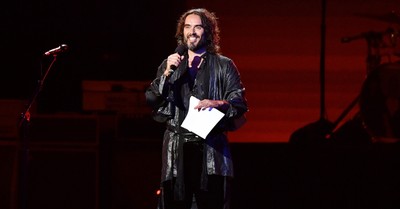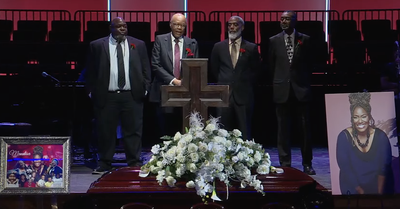(CNSNews.com) - Claims about a Bible ban at next summer's Beijing Olympic Games, while denied by Chinese officials, will refocus attention on the state of religious freedom under a regime that allows churches to operate and Bibles to be printed and sold -- but only on its own terms.
China's foreign ministry spokesman, Liu Jianchao, on Thursday dismissed as "sheer rumors" reports saying that foreign athletes would not be allowed to bring Bibles to the Olympic village.
Chinese law allows foreigners to bring in religious publications, audio and video materials, or other religious objects for personal use, Liu said.
He questioned the motives of those behind the Bible ban claims -- first reported in Italian and Spanish newspapers earlier this month -- saying they should not try to undermine mutual understanding between China and the rest of the world.
"There are always some people who do not want to see China host a successful Olympic Games," the state-run China Daily quoted Liu as saying.
But while China insists that religious freedom is respected, the law cited by Liu makes clear the extent of government control.
Promulgated in 2000, the "Rules for the Implementation of the Provisions on the Administration of Religious Activities of Aliens within the Territory of the People's Republic of China" restrict foreigners from bringing into the country any religious books and articles "that exceed rational personal use."
They also may not bring in articles whose contents "are detrimental to Chinese national security and the public interests of Chinese society."
The law forbids missionary activity and restricts outsiders' contact with Chinese co-religionists to those belonging to churches, mosques, temples and monasteries recognized by the government.
When it comes to Christianity, Beijing permits only one Protestant organization, the Three-Self Patriotic Movement (TSPM). Set up in 1950, the group's name stresses the aim of resisting outside influences, with the goals of "self-governance, self-support and self-propagation." An affiliated body established in 1980 is known as the China Christian Council (CCC).
There are only five state-sanctioned Protestant churches in Beijing, a city whose population last summer passed the 17 million mark.
China allows one "patriotic" Catholic organization, also formed in the 1950s to supervise Chinese Catholics.
Religious regulations implemented in 2005 underlined the requirement that all religious groups be affiliated with the state-sanctioned organizations. According to the U.S. Commission on International Religious Freedom, an independent statutory body, the government requires this as a way "to manage religious activity and maintain control of independent religious institutions and practice."
The two "patriotic" associations claim 18 million and five million members, respectively.
But religious freedom advocacy groups say the actual number of Christians in China -- the world's fastest-growing body of believers -- is anywhere from 60 to more than 100 million. The vast majority are Protestants belonging to the illicit "house church" movement, and Catholics loyal to the Vatican rather than Beijing's "patriotic" body.
The Cardinal Kung Foundation, which monitors and campaigns against Chinese persecution of Roman Catholics, reports that at least four bishops are currently in prison (a fifth died in jail last September), another two are in hiding and a further eight under house arrest or strict surveillance. It also lists 12 Catholic priests in prison.
The China Aid Association said in its report for 2006 that according to its sources alone, the government detained more than 600 Protestant Christians during the year, of which 18 were sentenced to more than one year's imprisonment.
CAA cautioned that the statistics should "be viewed in light of the fact that much of the Chinese House Church understandably remains hidden from the authorities."
'Forty million Bibles'
For eight consecutive years, the State Department has named China as a "country of particular concern" for egregious religious freedom violations targeting Protestants, Catholics, Tibetan Buddhists, Uighur Muslims and adherents of the Falun Gong, a meditation sect outlawed in 1999 as an "evil cult."
China, which is renowned for its sensitivity to criticism of its human rights record, routinely points to the thriving "patriotic" Protestant and Catholic churches. It also notes that millions of Bibles are printed and sold cheaply in China.
But there, too, Beijing maintains its control.
China permits only one publishing house, Amity Press, to publish Bibles, which are sold only through state-sanctioned churches. Operating since 1987, the TSPM/CCC-linked company says on its website it printed its 40 millionth Bible last year.
Christian advocacy groups outside China say that doesn't tell the full story.
According to Open Doors, an international organization whose origins go back to the smuggling of Bibles into the Soviet bloc during the Cold War, there is still a need to take Bibles into China.
Open Doors says there aren't enough Bibles printed internally; they aren't readily available to millions of believers in the rural areas; and there is also a serious need for Bibles for children and for study versions that include cross-references and concordances.
With half a millions foreign visitors expected for the Olympics, the Chinese authorities are reiterating the "personal use only" restriction.
"Each traveler is recommended to take no more than one Bible into China," says an advisory for Olympics spectators, posted on the official event site. It also says that any material "detrimental to China's politics, economy, culture and ethics" are forbidden.
China is not only concerned about unauthorized Bibles entering the country from abroad. In July 2005 an underground church pastor was fined and jailed for three years -- including 10 months already spent in custody -- for illegally printing Bibles and other Christian publications.
The formal charge against Cai Zhuohua - and his wife and brother-in-law, who received lesser fines and prison sentences - was "illegal business practices."
Christian Solidarity Worldwide, an advocacy group, said the case highlighted both the restrictions on producing literature and demonstrated a new tactic of restraining religious freedom under the guise of prosecution for a so-called economic crime.
Cai completed his sentence last September. Voice of the Martyrs reported that he had not been allowed a Bible while in prison, and that upon his release he was ordered to report regularly to public security offices and not to attend church services.
'Misunderstandings'
In recent years differences have occasionally arisen among Christian ministries about the extent of persecution in China. Some organizations argue that working within the legal framework enables them to help millions of Christians.
Ned Graham, whose East Gates Ministries has been distributing Amity Press-printed Bibles in China under government contract for over a decade, said in a CBN television interview last month that there was "absolutely no need to smuggle Bibles into China any more."
CCC delegations traveling abroad spread the message that Christianity in China is thriving (After one visit to Hawaii, the CCC reported that the trip "helped to address and clear misunderstandings of the present situation in China by those who have never visited China or have limited knowledge of its recent history.")
A U.S. evangelist caused a storm in 2005 when he suggested during a visit to China that the situation wasn't as bad as reported and that underground Christians should register with the state-sanctioned church bodies. He later apologized.
Open Doors in a 2006 position paper said that although there are good opportunities to help Christians who worship in official churches, "those opportunities in no way meet the needs of the entire church. We must not be misled by government propaganda or half-truths that emanate from Western-visitors-turned-China-experts that echo the official line."
Make media inquiries or request an interview about this article.
Bibles in China: Regime Sets the Rules
Patrick Goodenough
| International Editor
| Updated: Nov 12, 2007










